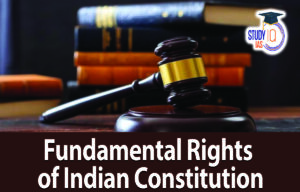Table of Contents
Berubari Case 1960
The Berubari Case of 1960 was a landmark case in the history of the Indian Constitution. In the Berubari Union Case, the President consulted with the Supreme Court of India regarding the Nehru-Noon Agreement that was signed between the Prime Minister of India and the Prime Minister of Pakistan. The case concerned the disputed territory of Berubari, which was located on the border between India and Pakistan. The dispute was that the West Bengal State Government did not want to give any territory of Berubari to Pakistan.
Berubari Union Case Background
As per the Indian Independence Act, of 1947, the boundaries of India and Pakistan were to be assessed by the ‘award’ of a boundary commission chosen by the Governor-General. The term “award” refers to the conclusion drawn by the commission’s chairman and included in his final report and submitted to the Governor-General. Consequently, under the chairmanship of Sir Cyril Radcliffe Governor-General appointed a commission.
India and Pakistan did not accept the “award” that the Radcliffe committee determined it to be. Consequently, boundary disputes between the two nations arose. To resolve these boundary disputes Indian Prime Minister Shri Jawaharlal Nehru and Prime Minister of Pakistan Mr. Feroze Khan Noon signed an agreement in 1958.
Nehru-Noon Agreement, clearly stated that the territory of Berubari will be equally distributed between India and Pakistan. Therefore, the President took the matter to the Supreme Court under Article 143. The points made in the Berubari Union Case were repeated in the Kesavananda Bharati Case decision and provided clarity.
The Supreme Court’s judgment also mentioned that the Preamble of the Constitution serves as a guide to open the minds of the makers of the law. However, the Preamble of the Indian Constitution is not the source of all the powers given to the Indian Government by the Constitution of India.
Berubari Case Related Constitutional Provisions
Here are the important Constitutional Provisions that are related to the Berubari Case:
| Article | Details |
| Article 1(3)(c) | This Article of the Indian Constitution states that Indians can acquire foreign territory. |
| Article 3 | This Article of the Indian Constitution gives power to the parliament to increase, decrease or alter the boundary of any state. The parliament can even alter the name of any state. |
| Article 368 | This Article of the Indian Constitution provides power to the parliament to amend the Constitution and its procedures as per the rules laid down in this Article. |
Berubari Union Case Associated Issues
There were mainly two issues associated with the Berubari Union Case:
- Firstly, Whether the parliament has the power to grant any territory of the state to a foreign country under Article 3 of the Indian Constitution.
- Secondly, whether legislative action is necessary for the implementation of the Nehru-Noon Agreement.
Berubari Union Case Arguments
Government’s Argument
Union Government contended that the agreement is merely a recognition of the boundary which had previously been decided and it is not a substitution or creation of a new boundary or the alternation of the boundary.
It was further contended that if any portion of land had been given to Pakistan, according to the ‘award’ of the boundary commission, it does not equate to the cession of the territory of India as it is simply a mode of settling the boundary dispute.
Arguments Against Union Government
The preamble to our Constitution states that like the democratic republic form of government, the entire territory of India is out of reach of the Parliament and cannot be affected either by any legislation or even by an amendment under Article 368.
Our Constitution’s Article 1(3)(c) provides the country with the authority to acquire new territories, but it makes no provisions for ceding any of its existing territories.
Berubari Case 1960 SC Judgement
Preamble: The Supreme Court further concluded that the Preamble is not a part of the Indian Constitution.
Article 1(3) (c): Supreme Court, held that the article does not grant authority to India to acquire territories. It makes a provision for the absorption and integration of foreign territories that may be acquired by the Indian Union.
Article 368: It was decided that amending Article 1 is under the purview of the power to amend our Constitution. Hence, it would logically include the power to cede national territory in favour of a foreign state.
This means Nehru-Noon Agreement is subjected to the approval of both houses of parliament. Any territory of India can be ceded to a foreign country only after amending Article 1 with a special majority of parliament.
Berubari Union Case Judgement Other Implications
The Berubari Case also had a number of other implications for the Indian Constitution. It confirmed that the preamble of the Indian Constitution is not a part of the Constitution, but is an important guide to its interpretation. It also helped to clarify the relationship between the Indian Parliament and the Supreme Court.
The Berubari Case is still relevant today. It is a reminder that the Indian Constitution is a living document that is subject to interpretation and change. It also underscores the importance of the rule of law in a democracy.
The parliament had to bring the Ninth Amendment Act in 1960 that amended Schedule 1 of the Indian Constitution. The Berubari Union was finally given to Pakistan under the conditions of the Nehru-Noon Agreement.
Berubari Case 1960 Summary
Specifically, the Berubari Case 1960 addressed the following issues:
- The validity of the Constitution (Ninth Amendment) Act, 1960
- The scope of the Indian Constitution
- The relationship between the Indian Parliament and the Supreme Court
The Supreme Court’s decision in the Berubari Case 1960 was significant because it:
- Upheld the validity of the Constitution (Ninth Amendment) Act, 1960
- Recognized that the preamble of the Indian Constitution is not a part of the Constitution, but is an important guide to its interpretation
- Established that the Indian Parliament has the power to amend the Constitution
- Confirmed the Supreme Court’s authority to interpret the Constitution


 Article 142 of Indian Constitution, Sign...
Article 142 of Indian Constitution, Sign...
 Pakistan-Occupied Kashmir (PoK): History...
Pakistan-Occupied Kashmir (PoK): History...
 Fundamental Rights of Indian Constitutio...
Fundamental Rights of Indian Constitutio...





















